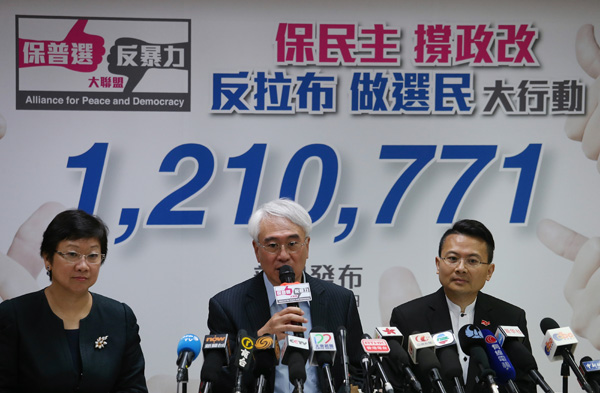|

|
|
Robert Chow Yung (second from left), spokesman for the Alliance for Peace and Democracy, meets the media with fellow members at a news conference in Hong Kong on Monday. The alliance has received more than 1.2 million signatures from Hong Kong residents in its campaign to support the government's electoral reform package. Roy Liu / China Daily
|
For some political scientists, “democracy” means the right to vote in elections held every four, five years or six years. Perhaps countries such as Sweden and Switzerland practice a good form of democracy. But in the world’s two largest democracies, the United States and India, contesting an election is a highly expensive affair. In a majority of cases, a candidate has to spend millions of dollars to have any chance of success.
In India, many candidates cross the legal limit for total campaign expenditure in a single day. And even in elections to city councils, a serious candidate usually has to spend several hundred thousand dollars.
What this means in practice is, people without access to huge amounts of money have almost zero chance of getting elected. In other words, more than 99.5 percent of the population don’t have even the remotest chance of winning an election, simply because they don’t have access to big money.
In the US, the Supreme Court has ruled that billionaires and multimillionaires have the right to spend their money to promote candidates who can further their interests and oppose those who seek equal treatment for the rich and poor. The Supreme Court, in other words, has given big money the legal right to influence elections, because that is what “democracy” is all about.
How can a candidate with no money compete for votes with a candidate with millions of dollars to burn in his/her quest to “represent the people”? How many of the US Congress members are not millionaires? Perhaps not even one. Does that mean all American citizens are millionaires just because those who “represent” them are?
The Indian province of Maharashtra has a constituency where most people are very poor. Yet the politician who represents them is a billionaire who uses his political clout to help himself and his friends accumulate more wealth, instead of fulfilling his duty of improving the lives of the poor who voted him to power.
